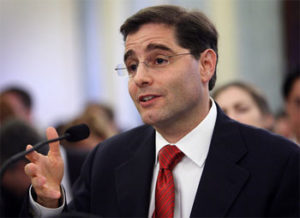
Net neutrality apparently isn’t dead after all: Federal regulators are moving ahead with a plan to prohibit phone and cable companies from blocking or discriminating against internet traffic flowing over their broadband networks, despite Republican opposition to the plan in Congress.
Julius Genachowski, chairman of the Federal Communications Commission (FCC), will outline his proposal for so-called “net neutrality” rules in a speech on Dec. 1.
Despite Republican opposition, Genachowski plans to bring his proposal to a vote by the full commission before the end of the year; many observers thought this was unlikely to happen after Republicans seized control of the House in last month’s elections.
Net-neutrality rules were one of the Obama administration’s top campaign pledges to the technology industry and have been among Genachowski’s priorities since he took over the FCC more than a year ago.
Many big internet companies, such as search leader Google Inc. and calling service Skype, as well as public-interest groups and some education organizations, insist regulations are needed to ensure broadband companies don’t use their control over internet connections to dictate where consumers can go and what they can do online.
But Genachowski has run into substantial opposition from big phone and cable companies, including AT&T Inc., Verizon Communications Inc., and Comcast Corp., which argue that they should be allowed to manage their networks as they see fit.
Genachowski has spent the past several months trying to craft a compromise.
His new proposal would “culminate recent efforts to find common ground” and create “rules of the road to preserve the freedom and openness of the internet,” according to an advance copy of his remarks.
The plan—which builds on a set of FCC principles first established under the previous administration in 2005—would require that broadband providers let subscribers access all legal online content, applications, and services over their wireline networks.
But it would give broadband providers flexibility to manage their systems to deal with problems such as network congestion and unwanted traffic like spam, as long as they publicly disclose their network management practices.
The proposal also would prohibit wireless carriers from blocking access to any web sites or competing applications such as internet calling services on mobile devices, and it would require them to disclose their network management practices.
But it would give wireless carriers more leeway to manage data traffic, because wireless systems have more bandwidth constraints than wired networks. That provision is likely to draw fire from public-interest groups, which argue that wireless networks should have the same protections as wired systems, particularly as more and more Americans go online using mobile devices.
In addition, the proposal would allow broadband providers to experiment with routing traffic from specialized services such as smart grids and home security systems over dedicated networks, as long as these services do not hurt the public internet.
In one key victory for the phone and cable companies, Genachowski’s proposal would leave in place the FCC’s current regulatory framework for broadband, which treats broadband as a lightly regulated “information service.”
The agency has been trying to come up with a new framework since a federal appeals court in April ruled that the FCC had overstepped its existing authority in sanctioning cable giant Comcast for discriminating against internet file-sharing traffic on its network—violating the very net-neutrality principles that Genachowski now hopes to adopt as formal rules.
To ensure that the commission would be on solid legal ground in adopting net-neutrality rules and other broadband regulations following that decision, Genachowski had proposed redefining broadband as a telecommunications service subject to “common carrier” obligations to treat all traffic equally.
But that effort quickly triggered a fierce backlash from the phone and cable companies, as well as many Republicans on Capitol Hill—prompting Genachowski to abandon it in his current plan.
Genachowski’s new plan is based in large part on a proposal that Rep. Henry Waxman, D-Calif., the outgoing chairman of the House Commerce Committee, tried unsuccessfully to push in Congress several months ago.
Waxman, too, ran into opposition from Republicans who warn that net-neutrality rules amount to burdensome regulation that would discourage broadband providers from investing in their networks.
With Republicans set to take over the House next month, Genachowski is running out of time to get his net-neutrality proposal through the FCC without being blocked by lawmakers.
Supporters argue that net-neutrality rules are critical to preserving an open internet and ensuring that phone and cable companies cannot slow or block online phone calls, web video, and other internet services that compete with their core businesses.
Indeed, the online file-sharing service blocked by Comcast was used in large part to trade movies and other video over the internet. Net-neutrality proponents also want rules to ensure that broadband companies cannot favor their own online traffic or the traffic of business partners that can pay for priority access.
Many higher-education technology officials also support net-neutrality rules to ensure that smaller institutions without massive technology budgets are on a level playing field with their larger counterparts in being able to deliver online content to students.
But the phone and cable companies insist they need flexibility to manage network traffic so that high-bandwidth applications—such as online video—don’t hog capacity and slow down their systems.
They say this is particularly true for wireless networks. The communications companies also argue that after spending billions to upgrade their lines for broadband, they need to be able earn a healthy return by offering premium services.
- Research: Social media has negative impact on academic performance - April 2, 2020
- Number 1: Social media has negative impact on academic performance - December 31, 2014
- 6 reasons campus networks must change - September 30, 2014

